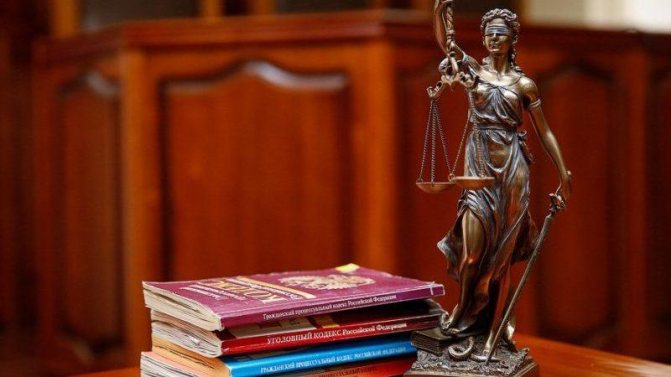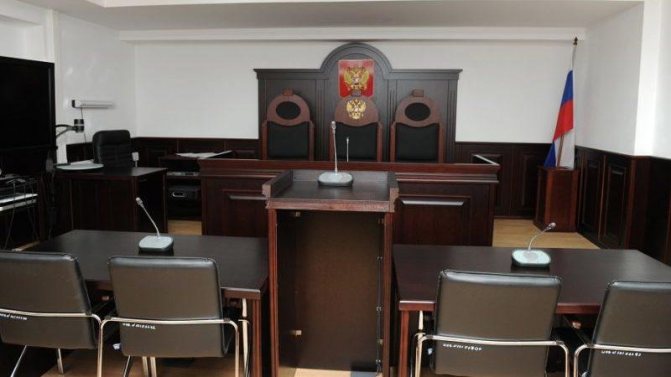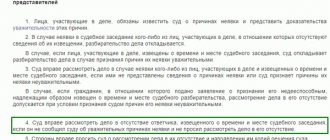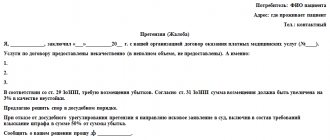Grounds for disqualifying a judge
The grounds for disqualifying a judge are listed in the articles of the Civil Procedure Code of the Russian Federation. They are mainly related to the judge’s possible interest in the outcome of the case. The judge may be someone’s relative, or may have previously taken part in the case in a different capacity, including considering the case as a judge of a different instance. The judge who was the judicial conciliator in this case is subject to recusal.
What does judicial practice say - how often are challenges used?
According to the legislation of the Russian Federation, the challenge of a judge must be reasoned. This means that applications without justification will be automatically rejected. After all, often the true motivation of someone who decided to remove a judge is ordinary dissatisfaction with some of his actions.
The Constitutional Court of the Russian Federation has pointed out many times that it is required to provide conclusive evidence of the existence of the grounds listed in the Arbitration Procedure Code of the Russian Federation.
The most difficult situation is when the judge has any personal interest in the case. In Art. 21 says that it does not matter what form it takes - indirect or direct. However, a challenge citing this condition is very rarely taken into account.

Everything is much simpler if the judge has relatives among the participants in the process. It is easy to prove this if you have official documents that can confirm this , which means that the chances of a positive decision on challenge on this basis are much greater.
Let's say you want to prove that the judge declared something about the case before the proceedings had already begun. Then the best evidence in this case will be photo or video materials.
Judicial practice of challenging a judge in arbitration proceedings shows that often such a procedure begins in cases where the official does not act impartially, but has some preferences. For example, if all participants in the proceedings noticed that he does not like one of the parties or he too clearly gives her an advantage.
Drawing up an application
A challenge can be made orally or in writing. We recommend that statements to the court always be made in writing. In this case, the content of the application and the grounds for challenging the judge will correspond exactly to what you wanted to indicate.
When drawing up an application to challenge a judge, download our sample. Fill it out taking into account your situation. The application must contain the following information:
- court where the application is filed
- person filing a challenge and its procedural status
- parties to the case, essence of the claim, civil case number
- title of the document: Application to disqualify a judge
- grounds for withdrawal
- evidence of grounds for challenge
Filing an application to disqualify a judge
You can file a petition to disqualify a judge orally or in writing. It is preferable to use a written statement of recusal of the judge, as it will be included in the case file. And its content, unlike an oral statement of recusal, cannot be distorted or interpreted differently. The text of the petition must provide specific circumstances of the impossibility of the participation of this judge in the consideration of the case.
The Civil Procedure Code does not contain requirements for the content of an application for challenge. However, it is necessary to adhere to the general rules for drawing up business documents, including documents addressed to the court. In order to ensure a high-quality and competent execution of the application, we recommend using the general rules for preparing documents for the court.
We recommend filing an application to challenge a judge at the beginning of the court hearing, after clarification of the right to file an application for recusal. Although you can challenge at any stage of the trial, up to the removal of the judge to the deliberation room.
Terms of consideration
After a document on the challenge of a judge in arbitration proceedings according to the sample has been drawn up, it is considered and a decision is made on it. If the answer is yes, the new judge or panel will need some time to become familiar with the case and all its details.
Typically, this replacement procedure takes up to several weeks , which is why some lawyers specifically resort to it in order to get the necessary time to prepare for the process itself.
Can I reapply?
for the same person and on the same grounds to submit an application to challenge a judge in an arbitration court It will also be impossible to appeal a refusal to challenge, especially in cases where the citizen or organization simply did not provide sufficient evidence that the basis for the challenge actually exists.

Already at the end of the trial, after the decision has been made, you can appeal it in the manner established by the court . However, this is recommended to be done only in cases where one of the parties is sure that the decision is unreasonable or contradicts the norms of legislative acts.
Is the case stopped if there is a refusal/challenge?
If an application to disqualify a judge in an arbitration court is rejected, then the proceedings in the case continue, and otherwise, they will be suspended until the moment when the new judge is ready to initiate the case. This means that the whole procedure will start from the very beginning. That is why it may take longer.
Reference. The case will be considered by a new judge or panel in the same arbitration court. This is established by the relevant articles of the Arbitration Procedure Code of the Russian Federation.
Consideration of an application for challenge
Based on the application for recusal, the judge issues a separate ruling. To make such a determination, the judge must retire to the deliberation room.
If the application to challenge the judge is satisfied, the court session is closed.
The decision to disqualify a judge is not subject to independent appeal. You can include arguments about disagreement with the court’s decision to consider the application for challenge in a complaint against a court decision based on the results of the consideration of the case.
Recusal of a judge in the practice of arbitration courts
The recusal of a judge, being a means of ensuring the right to a fair trial, is, nevertheless, an emergency measure, because it is declared, as a rule, to a specific judge, and therefore is either the result of a previously arising conflict, or its cause. A conflict with a judge, as the person in charge of the case, is in any case an extremely unfavorable situation for the party involved. Not only does the presence of such a conflict, de facto, affect the judge’s attitude towards it and, ultimately, the decision made. Recently, the practice of imposing court fines on a person participating in a case for unfounded challenges, interpreted as contempt of court (this practice was analyzed in detail by K.A. Sasov [1]).
Accordingly, the representative’s task is to avoid such a situation unless absolutely necessary, and if it occurs, to act as efficiently as possible. After all, we, professional representatives, act not in our own interests, but in the interests of the principal, and cannot sacrifice his interests to our personal ambitions and passions. In this regard, it seems interesting to study the practice of arbitration courts in considering applications for challenge in order to understand in what situations we can count on success, and when we are obviously doomed to failure.
In total, in preparing this material, 60 rulings and other judicial acts of arbitration courts (for example, cassation court decisions) containing the conclusions of the courts based on the results of consideration of applications for the disqualification of judges were studied[2]. The results are presented in the attached table (the file “Selection of judicial practice on taps” is attached), and here we present a short overview of the results of our mini-research and some conclusions.
Satisfied withdrawals.
So, probably, the very first question that a practitioner may be interested in is: what is the ratio of the share of satisfied challenges to rejected ones? Of the 60 cases studied, the challenge was granted in 21. It would seem not bad, however, it should be taken into account that of the 21 challenges that were satisfied, 14 were self-challenges, and only 7 were challenges declared by a person participating in the case. However, 7 satisfied challenges against 39 rejected ones is already not bad.
It is also gratifying that if there are family or other connections with persons participating in the case, judges take the initiative and recuse themselves, even if proving interest can be quite labor-intensive (for example, in one of the cases the judge recused herself because she is a kunaki on one of the parties [3], and in the other - because he previously worked in an organization associated with one of the founders of the person participating in the case, and is personally acquainted with the founders).[4]
However, in some, much more obvious cases, judges did not recuse themselves, and the parties had to do so. Thus, in one of the cases, a challenge was filed because the judge was previously an employee of a person participating in the case (this person is Rosreestr)[5], and in another, the judge is the son of the head of a third party (the third party is the department of the Federal Registration Service for subject)[6]
In general, challenges on the basis of proven family service or other close relationships with the party, both in the past and at the present moment, have the greatest chance of success. At least, it was not possible to find a single such challenge that was rejected. Also, a valid basis is the participation of a judge in the consideration of this case in other instances.
But a challenge motivated by the judge’s behavior during the trial (which is very popular among representatives) has the least chance of success. Among the satisfied challenges, there are only 3 of these, and only 1 is directly related directly to the actions of the judge in directing the court hearings, while the other 2 are only related to the facts that arose in connection with the process.
In the first case, the judge, stopping the audio recording of the meeting, persuaded the applicant to change his position on the case[7], in the other two, the judge, before the end of the consideration of the case, published the operative part of the decision on the case[8] and before considering the petition outside the trial, informed the court staff of the decision on it[9 ]
The practice of considering challenges in the Arbitration Court of the Republic of Adygea is interesting. In several cases, when considering the challenge to a judge, the applicant’s arguments were recognized as unfounded, and the absence of grounds for challenge was stated, but then the challenge... was granted. As the court indicated, “for the purpose of a comprehensive, complete consideration of the case, in order to avoid confrontation between the applicant and this judge”[10]
Rejected bends.
When considering rejected cases, one involuntarily draws attention to the fact that, although each challenge is unique, the applicants state similar arguments over and over again. The three most frequently repeated are:
1) the judge previously expressed a position relevant to the case in another judicial act;
2) the judge makes procedural decisions to please the other party (rejects the petition, refuses to attach documents, order an examination, etc.), or otherwise conducts the process in a manner that is not what the party considers correct.
3) the judge behaves incorrectly towards the party.
The first two reasons are clearly unpromising. The latter theoretically has a chance of success, although they are not high. Let's take a closer look.
When is there really no chance?
Of the 39 rejected challenges, 9 were filed due to the existence of decisions previously made by this judge. Thus, some applicants believed that, having established the facts and circumstances in the previously considered case, the judge formed an opinion about them that prevented an impartial consideration of this dispute. For example, a challenge was filed to judges who had previously considered in another case the issue of holding persons controlling the debtor accountable [11] In another case, the judge had previously considered disputes involving the person who filed the challenge [12] The judge who previously considered the issue was rejected on the inclusion of the creditor's claims based on the agreement, which must be assessed in this dispute.[13] Rejection of these challenges seems quite natural, as well as in cases of challenges due to the fact that the judge has already considered similar cases and, thereby, expressed his opinion on how they should be resolved[14].
The general approach of the courts regarding such challenges is that the judge, acting reasonably and in good faith, does not become biased due to the very fact of considering cases that overlap in subject composition, factual circumstances, or, moreover, are simply similar. In the case of cases previously considered by the court, only challenges are triggered, under which lie the grounds directly provided for by the Arbitration Procedure Code of the Russian Federation: for example, when a judge previously participated in the consideration of the case on the merits in the first instance, and the cassation court ordered the case to be considered in a different composition of the court [15 ]
Another popular basis for a futile challenge is various procedural actions and court decisions during the consideration of the case, regarded by the applicant as indicating the bias of the court. On these grounds, 23 rejected challenges were filed[16]. In many of the above-mentioned cases, the applicants’ arguments also included incorrect behavior of the court during the trial (i.e., violation of ethical standards of interpersonal interaction: increased tons, dismissive attitude, etc.)[17]
Regarding the argument that procedural actions are carried out in favor of the other party, or against the interests of the party that filed the challenge, the courts have a completely unambiguous position: procedural activities to exercise powers cannot serve as a basis for disqualifying a judge. In other words, drawing far-reaching conclusions from the very fact of making certain decisions is futile. If you disagree with the actions of the court during the trial, instead of filing a challenge, it is more advisable to focus on preparing the grounds for a future appeal than to raise the issue of challenge, which is obviously futile.[18]
Incorrect behavior of a judge as a basis for recusal.
As for the incorrect behavior of the judge during the trial, for every 10 rejected challenges[19] there are 3 satisfied ones. We reviewed satisfied challenges on this basis above. An impartial reader will agree that in the presence of such circumstances, the court had no other reasonable decision but to satisfy the challenge (remember, challenges were satisfied when the judge, stopping the audio recording, persuaded the party to change their position, when the judge published the operative part of the decision before it was made, and when everything the court staff knew the decision on a certain petition that had not yet been considered, and the representative managed to prove this fact)[20]
In a number of cases, the applicant’s arguments looked quite reasonable, but did not find support from the judge considering the challenge. Thus, the applicant referred to the fact that during the trial the judge raises his voice, does not accept documents, interrupts the speeches of the applicant’s representative, and accuses the applicant’s representative of forgery of documents. The ruling in this case noted that the applicant’s arguments about the judge’s inappropriate behavior when reading the audio recording of the court hearing were not confirmed, and the peculiarities of the pronunciation of individual words, speech patterns, the degree of their emotionality cannot indicate interest[21] (i.e. that is, reading between the lines, the applicant’s arguments were, at a minimum, not unfounded).
In any case, correct behavior is a relative thing, and it is clear that making predictions in such situations is quite difficult. Yes, challenges on this basis are more often rejected, however, cases when a judge is removed as a result also occur. So, if this basis is obviously unpromising, it is not.
Anomalies.
Finally, it is impossible not to say a few words about the fact that when considering challenges, quite often there are decisions that are clearly motivated not directly by the requirements of the law, but by certain motives that are not disclosed in the rulings of the courts. This is evidenced by their obvious illogicality.
So, above we have already talked about cases of satisfaction of challenges in the Arbitration Court of the Republic of Adygea, when the applicant’s arguments are recognized as unfounded and the absence of grounds for challenge is stated, however, the challenge is granted “for the purpose of a comprehensive, full consideration of the case, in order to avoid confrontation of the applicant with this judge”[ 22]
However, it would be a mistake to think that such cases occur only in Adygea. For example, there are facts of recusal by the court, from which it is not clear what specific circumstances influence the judge’s bias.
It happens that a judge recuses himself citing some conflict of interest, which is not indicated by him in any way.[23] Or, a curious incident occurred when a judge was challenged, which was found to be unfounded, but the judge immediately recused himself “to avoid a conflict of interest,” which was immediately granted.[24]
From a legal point of view, these situations are not entirely normal, since judicial acts, including challenges, must be motivated, justified and quite specific. The reasoning “there are no grounds, but the challenge will be satisfied” is puzzling. However, from the point of view of common sense, if the judge himself admits the presence of some interest or bias, then it is better to let him be removed than to continue to consider a case in which he himself feels impartial. In addition, apparently, sometimes judges considering challenges come to the conclusion that the conflict situation in the case itself precludes its normal consideration, and the challenge is granted more likely in connection with the current unhealthy situation than directly guided by the grounds that were stated. It’s not clear what prevents us from directly indicating this in the definition as it is, fortunately, paragraph 5 of Part 1 of Art. 21 of the Arbitration Procedure Code of the Russian Federation makes the list of circumstances indicating the interest of a judge open?
Conclusions.
So, the analysis allows us to draw the following conclusions.
A challenge based on a proven connection between the judge and the person involved in the case has the greatest chance of success. In most such cases, judges recuse themselves, but not always. Accordingly, if such grounds exist, one must be ready to take the initiative.
A recusal motivated by procedural decisions of the judge (refusal of motions, non-acceptance of evidence, and so on) has practically no chance of success, unless the judge either loses his nerve and recuses himself, or the conflict turns out to be so strong that the recusal will be satisfied in order to maintain the impartiality of the court. However, when relying on this option, it should be remembered that if the representative is suspected of using a challenge and creating a conflict situation in order to put pressure on the court, this may be regarded as contempt of the court and result in a court fine for the principal. Moreover, from an ethical point of view, such manipulations of the court (to put it mildly) are not flawless.
It also makes no sense to refer to decisions and other judicial acts previously made by a judge: this is not accepted by the courts as a public statement or assessment on the merits of the case in the sense of paragraph 7 of Part 1 of Art. 21 Arbitration Procedure Code of the Russian Federation. The same can be said about cases when a judge allows an assessment of the evidence presented by the parties during the process: this is regarded as the judge’s leadership of the process and indicates the judge’s fulfillment of the duty of paragraph 3 of Art. 9 of the Arbitration Procedure Code of the Russian Federation, and has never been accepted as a basis for challenge.[25]
In the event of inappropriate behavior by a judge, it is important to have proper evidence at hand. You should not rely on the audio protocol, because, as in one of the cases described above, the judge can stop the recording. Accordingly, having your own voice recorder is simply necessary for such situations. The court's decision in such cases largely depends on the specific situation, but in any case, the chances of success here are much higher than in the two previous options.
[1] K.A. Sasov. Recusal of a judge as “influence on the court”// blog post by K.A. Sasov on the Zakon.ru portal from 08/21/2018, found on 09/23/2018 at the link https://zakon.ru/blog/2018/08/21/otvod_sude_kak_vozdejstvie_na_sud
[2] Determinations for 2021 and 2021 were obtained using the “Bank of Arbitration Court Decisions” system (https://ras.arbitr.ru/), earlier ones - using the online database “Sudakt.ru” (https:// sudact.ru). The use of an unofficial source along with the official one is due to the fact that searching for such definitions in the “Bank of Arbitration Court Decisions” is quite inconvenient (in principle, there is no option for searching for interim judicial acts), at the same time, searching using keywords on Sudakt.ru (subjectively according to the author) was implemented much more successfully.
[3] Determination of the Court of Justice of the Republic of Dagestan dated December 4, 2013 in case No. A15-3855/2014, No. 11 in the table.
[4] Definition of AS of the Saratov region. dated December 2, 2014 in case No. A57-5400/2012, No. 21 in the table.
[5] Determination of the Administrative Court of the Republic of Adygea dated July 18, 2014 in case No. A01-546/2014, No. 9 in the table.
[6] Definition of AS of the Penza region. dated April 15, 2013 in case No. A49-4416/2012, No. 6 in the table.
[7] Definition of AS of the Saratov region. dated December 23, 2013 in case No. A57-20306/2013, No. 12 in the table
[8] Determination of the Altai Territory AS dated November 13, 2014 in case No. A03-8411/2013, No. 2 in the table
[9] Determination of the AS of the Kaliningrad region dated February 29, 2016 in case No. A21-569/2016, No. 3 in the table
[10] Determination of the Administrative Court of the Republic of Adygea dated January 20, 2014 in case No. A01-2052/2012, No. 10 in the table. Only one case is given here, however, anyone interested can see that this practice is relatively widespread in Adygea - all definitions are in the public domain.
[11] Determination 7 of the AAS dated September 14, 2018 in case No. A45-4279/2017, No. 29 in the table.
[12] Determination 15AAS dated 09/05/2018 in case No. A51-13144/2014, No. 28 in the table. A similar situation is in the Determination of the Administrative Court of the Republic of Mordovia dated March 20, 2013 in case No. A39-4965/2008, No. 53.
[13] Definition of AS of the Samara region. dated June 1, 2021 in case No. A55-6934/2016, No. 54 in the table;
[14] See Resolution of the Federal Antimonopoly Service of the East Siberian District dated March 27, 2014 in case No. A33-15551/2013, No. 39 in the table and Determination of the Administrative Court of the Komi Republic dated July 23, 2013 in case No. A29-4700/2013, No. 51 in the table.
[15] Determination 10 of the AAS dated July 21, 2014 in case No. A41-20697/2008, No. 1 in the table.
[16] Nos. 59,58, 57,56, 52, 50, 48, 47, 46, 45, 44, 42, 41,38, 35, 34, 33, 32, 31,26,25,24,23 in the table.
[17] №№59, 51, 52, 42,38, 26, 23
[18] Being a principled opponent of the use of recusal as a method of psychological pressure on the court, the author rejects this option.
[19] Nos. 59, 51, 52, 43, 42, 38,36. 26, 23, 22 in the table.
[20] See Definition of AS of the Saratov region. dated December 23, 2013 in case No. A57-20306/2013, No. 12 in the table, Determination of the AS of the Altai Territory dated November 13, 2014 in case No. A03-8411/2013, No. 2 in the table, Determination of the AS of the Kaliningrad Region dated 29.02 .2016 in case No. A21-569/2016, No. 3 in the table
[21] Definition of AS of the Samara region. dated June 30, 2021 in case No. A55-24205/2016, No. 52 in the table.
[22] Determination of the Administrative Court of the Republic of Adygea dated January 20, 2014 in case No. A01-2052/2012, No. 10 in the table. Only one case is given here, however, anyone interested can see that this practice is relatively widespread in Adygea - all definitions are in the public domain.
[23] Definition of AS of the Sverdlovsk region. dated September 26, 2013 in case No. A60-31067/2013, No. 13 in the table, or Determination of the AC of the Republic of Tatarstan dated 09/03/2018 in case No. A65-10682/2016, No. 16 in the table, Determination of the AC of the Republic of Karelia dated 03/30/2018 in case No. A26-3233/2017, No. 18 in the table.
[24] Determination of the AC of the North Caucasus District dated October 1, 2014 in case No. A32-31050/2013, No. 15 in the table.
[25] For example, such a situation was the subject of proceedings when the Arbitration Court of the Sverdlovsk Region issued a Determination. dated November 28, 2014 in case No. A60-34365/2014, No. 22 in the table.
Sample application for disqualification of a judge
Sample application (petition) to disqualify a judge in a civil case, taking into account recent changes in legislation. To file a motion to challenge a judge who is considering a civil case is the right of any person participating in the case. A copy of the application can be given to all participants in the case, since the court will consider such an application taking into account the opinions of other persons in the case.
In _________________________ (name of court) Plaintiff: ________________________ (full name, address)
Respondent: _____________
(full name, address) in civil case No. _______
Article 21 of the Arbitration Procedure Code of the Russian Federation. Recusal of a judge (current version)
The introduction of such a conciliation procedure as judicial conciliation entailed the emergence of a new basis for disqualifying a judge - his participation in the settlement of a dispute as a judicial conciliator (clause 3.1 of the commented article). Russian legislation is based on the inadmissibility of combining the functions of a judge and a judicial conciliator, granting the right to exercise the functions of a judicial conciliator exclusively to retired judges (Part 3 of Article 138.5 of the Arbitration Procedure Code). However, the resignation of a judge can be interrupted, which means that a situation cannot be ruled out when the same person acted as a judicial conciliator when considering a case by the court of first instance, and then in the same instance or during verification (revision) of a judicial act found himself in the status of a judge considering the relevant case on a claim, application, complaint or presentation. In this case, there is a risk of a negative impact of the conciliator’s knowledge of the dispute and the parties to the conflict on his objectivity as a subject of the exercise of the justice function. Therefore, the challenge in the described situation is intended to ensure the objectivity and impartiality of the judge when considering a case in which the judicial reconciliation procedure was previously applied.
The basis for disqualifying a judge has a clearly expressed unconditional nature, such as the presence of a family connection with any of the persons participating in the case under consideration, or their representatives. In this case, the presence of interest of the judge (arbitration assessor), in fact, is presumed, since the rights and obligations of the judge’s relative, and therefore his rights and obligations, may be affected by the court’s decision. And since the judge in this case is considered a priori interested, then there is no need to prove this interest, just an indication of the family connection itself is enough.
The degree of relationship discussed in the commented article is not defined by law. The mentioned family relationships, which exclude the participation of a judge in the consideration of the case, should be understood not only as the presence of close relationships, but also relationships of more distant degrees (cousins, sisters, etc.), as well as relationships of property (parents and relatives of the spouse, stepfather, stepmother and etc.). Thus, judicial practice knows cases of reversal of a court decision when, for example, a person who has an independent interest in the case was the first cousin of the spouse (second cousin) of the judge (another person who may be challenged).
The basis under consideration is also applicable if the judge is a relative of a deceased citizen acting as a plaintiff or defendant, as well as a person who in this case may be a plaintiff (co-plaintiff), brought in as a second defendant, co-defendant, or, according to the law, is obliged represent the rights of the plaintiff or defendant.
Within the meaning of Part 2 of the commented article, the presence of a family connection is excluded not only between the judge and any of the persons participating in the case or their representatives, but also between the judges who are members of the collegial composition of the court considering the case. It is impossible for a judge to participate in the consideration of a case even if there are grounds for recognizing him as a plaintiff, defendant or their legal representative in the case, as well as if he was questioned as a witness in the case or in fact is one.
The grounds for disqualifying a judge, enshrined in paragraph 5 of part 1 of the commented article, in contrast to those enshrined in paragraphs 1 - 4, 6, 7, are relative in nature. We are talking about the judge’s personal interest in the outcome of the case (both direct and indirect), as well as other circumstances that may raise doubts about his impartiality. At the same time, both terms used in this norm (“personal interest”, “other circumstances raising doubts about impartiality”) are not essentially disclosed in the law.
The relative (conditional) nature of the grounds under consideration presupposes at least two conditions for satisfying the challenge of the judge declared under paragraph 5 of Part 1 of Art. 21 agro-industrial complex. Firstly, an application for recusal on any of these grounds must be motivated, i.e. it must disclose specific circumstances indicating the interest and (or) impartiality of the judge. So, according to the fair remark of M.S. Falkovich, it is necessary to check whether the judge has personal prejudices or biases towards one of the parties to the case in the form of hostile or friendly relations. Secondly, the mentioned circumstances must be proven, i.e. the applicant citing relevant circumstances must attach to the application evidence confirming them.
———————————
Falkovich M.S. Challenges in the arbitration court // Business lawyer. 2005. N 14.
The direct interest of the judge is evidenced, in particular, by:
— existence of grounds for recognizing the judge as a plaintiff, defendant or their legal representative in the case;
- infliction of moral, physical or property damage to the judge hearing the case on the legal consequences of the offense by this offense (regardless of whether he personally filed claims or not);
— the existence of grounds for involving a judge in the case before him as a subject of financial liability for damage caused by the defendant.
Judicial practice has revealed a number of circumstances, which are often cited by the parties in applications for challenge with reference to paragraph 5 of Part 1 of Art. 21, but the following cannot serve as grounds for granting the application, in particular:
— repeated postponement by the judge of the consideration of the case at the request of a representative of the opposing party, which, in the opinion of the applicant, is delaying the proceedings;
— rejection of the applicant’s requests;
— refusal to admit a representative of one of the parties (the applicant for the challenge) to participate in the case on the grounds of disagreement with the documents confirming the powers of the representative of this party. Disagreement with documents confirming the powers of the plaintiff’s representatives is not a violation of the principle of equality of parties and is not a basis for disqualifying the judge. In Part 9 of Art. 66, art. Art. 119, 120 of the APC provide for the right of the court to impose a fine on persons participating in the case for failure to fulfill the obligation to present evidence required by the court and other persons for showing contempt of the arbitration court;
— violation of procedural law, in particular procedural violations at the stage of accepting a claim for proceedings.
Rejection of the defendant's petitions and satisfaction of the plaintiff's petitions does not mean the judge's unconditional interest in the outcome of the case in favor of the plaintiff, at least based on the fact that when resolving petitions and assessing evidence, the arbitration court, according to Art. Art. 67, 68, 71, 159 of the APC, has the right to be guided by his inner conviction, based on a comprehensive, complete, objective and direct examination of the evidence available in the case, taking into account the relevance, admissibility and reliability of each evidence.
As for procedural violations, as a general rule they serve as grounds for the cancellation of a judicial act by a higher court, provided that they took place and led to the issuance of an illegal judicial act, and not for disqualifying a judge on the grounds of his interest.
It is possible, subject to proper justification and evidence, to satisfy a challenge based on the impartiality of the judge in the following cases:
1) actual blocking of verification of the fact of falsification of evidence by issuing a ruling to suspend proceedings in the case without prior resolution of issues related to the previously appointed forensic examination;
2) repeated, over a long period of time, issuing rulings to postpone the case in the interests of preparing for the examination of one person - a participant in the case, subject to the timely fulfillment of all the requirements of the arbitration court by the other participant in the case.
As an independent basis for disqualifying a judge, the law provides for the judge (before the occurrence of a case or during its consideration in an arbitration court) to be in official or other dependence on a person participating in the case or his representative (clause 7, part 1 of the commented article). The legislator's logic seems to be as follows: although being in a state of dependence does not mean a priori that the judge will make an unreasonable and illegal decision, the dependent position itself may raise doubts about the impartiality of the judge. Service dependence always presupposes a subordinate position of the dependent subject. At the time of consideration of the case, official dependence may be due to the judge’s performance of any activity not prohibited by law, for example, teaching, if a party or other participant in the process in the case before him is an official of the relevant educational institution. Official dependence that occurred in the past will be a basis for challenge if, for example, the judge considering the case previously worked as a lawyer at the enterprise and was subordinate to the plaintiff, or if the representative of the party in the case is the former chairman of the court, and the judge considering case, was appointed to the position until the resignation of the chairman, acting as a representative.
An example of a judge being in a different position is a situation where the judge submitted his candidate's dissertation to the academic council of a university for admission to defense, and the representative of the party in the case is a person who is also the scientific secretary of the dissertation council.
The basis for challenging a judge, enshrined in clause 7, part 1, art. 21 of the APC, is directly related to professional judicial ethics (Article 22 of the Code of Judicial Ethics dated December 19, 2012). During the proceedings, the presiding judge and judges are obliged to refrain from expressing any assessments and conclusions on the merits of the case under consideration, up to the removal of the court to a separate room to make a decision (ruling), excluding any manifestations of bias and partiality. Therefore, a public assessment by a judge of the merits of a case considered by the court during the trial before a decision is made at first instance, in particular the public announcement of the fact that one of the participants in the process lost a “similar case” on the basis of documents presented by another participant in the process, is an unconditional basis for disqualifying the judge on the grounds clause 6, part 1 of the commented article.








